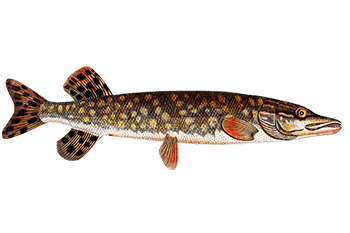
Fishing
Rouge National Urban Park
Fishing in the park is permitted as long as you have a valid Ontario fishing license. Familiarize yourself with the Ontario fishing regulations, it is an anglers’ responsibility to know the regulations for the area they are fishing.
Where to fish
The mouth of the Rouge River and the surrounding marsh area are popular fishing spots.
Fish species in Rouge National Urban Park

In the early season, commonly caught species include:
- Northern Pike
- Brown Bullhead
- Black Crappie, which spawn in Rouge Marsh.

Later in the spring, these can be caught as they travel to and from their upstream spawning sites:
- Rainbow Trout
- Suckers
- Carp

During mid-summer, many fish species are present, including:
- Smallmouth Bass
- Largemouth Bass
- Yellow Perch
- Carp
- Bullhead

While in late summer, as they travel upstream to spawn, you can catch:
- Chinook Salmon
- Rainbow Trout
- Brown Trout
For more information on species found in the Rouge Watershed, and past stocking activities, visit Fish ON-Line.
Fishing rules and regulations
Fishing Regulations:
- Ontario has several fishing zones, each with different open seasons and catch limits. Areas within the Rouge are part of zone FMZ16, while Lake Ontario is in zone FMZ20. Please carefully read the regulations of the fishing zone that applies to you. For information about all of Ontario’s fishing regulations, check out the Ontario Fishing Regulations Summary. It is the anglers’ responsibility to become familiar with the regulations of the area they are fishing.
Fishing License:
- All anglers aged 18-64 in Ontario require a valid outdoors card and fishing license. Licenses can be purchased online, over the phone (1-800-288-1155), at participating Service Ontario locations, or at a licensed vendor (such as local fishing and tackle shops and some Canadian Tire locations).
- Anglers under 18 or over 64 do not require a fishing license, but must carry a piece of federal or provincial identification which displays their name, and date of birth.
- There are multiple dates where fishing licenses are not required. These are:
- Family Fishing Weekend
- Mother’s Day Weekend
- Father’s Day Weekend
- Ontario Family Fishing Week
For more information about dates, visit the “License free family fishing” webpage.
Visitors Observing Fishing Regulation Violations:
- If you observe fishing regulation violations, contact our park wardens by phone at 1-877-852-3100.
Fishing safety
Water Safety:
- Do not conduct activities (like fishing) in the Rouge River after heavy rainfalls, particularly in the spring where rain that melts snow packs can lead to quickly changing water levels. Information about current water levels in the park can be found here.
- Due to river currents and changing temperatures, visitors should never walk on top of ice in the park, and always assume it is unsafe.
Consuming Fish from the Rouge Watershed:
- Fish consumption limits set out by the Government of Ontario should always be strictly followed.
Hook Safety:
- Anglers should keep distance from other visitors when fishing to avoid potential injury. Boardwalks within the park are high traffic areas where fishing is not permitted. Please obey the “no fishing” signs located at designated swimming zones in the Rouge Beach area.
- Hooks, fishing line, and other fishing gear should never become litter, and should be disposed of in designated receptacles. These items can become hazards to other visitors, and to the native wildlife. While angling at Rouge Beach, please deposit all fishing line into the Clear Your Gear fishing line recycling bins, located at most common fishing locations.
Invasive species
Various invasive species may be encountered while fishing in the park, some of the most notable are:
Round Goby:
- The Round Goby is a bottom-dwelling fish that entered the Great Lakes from the Black Sea. They are aggressive feeders, and are commonly encountered by Ontario anglers. It is important for anglers to learn how to identify them.
- If an angler catches a Round Goby, they are not to return it to the water. Instead, they should dispose of it at the nearest waste receptacle. Never transport, or keep a live goby in your possession.
Zebra Mussels:
- Zebra Mussels are an invasive species of shellfish commonly found in the Great Lakes. Native to the Black sea, they have had huge environmental and economic impacts to the area.
- Zebra mussel larvae are microscopic, and can survive outside of water for up to 18 days. Therefore, it is important for visitors to clean watercraft and other equipment, before moving it between different bodies of water.
Asian Carp:
- Asian Carp are a group of carp (grass, black, bighead, and silver carp) that are a significant threat to the Great Lakes ecosystem.
- Any angler who catches and identifies an Asian Carp is asked to call the invading species hotline at 1-800-563-7711.
Rusty Crayfish:
- Rusty Crayfish (Orconectes rusticus) is a highly invasive species. If transported to another waterbody, a single female carrying fertilized eggs can threaten entire populations of native crayfish.
- Anglers possessing a valid Ontario fishing licence can use crayfish as bait in the same location in which they are caught, only if used immediately after catching and not transported elsewhere first. It is Illegal to Take Crayfish out of Rouge National Urban Park. Transporting crayfish is also illegal under Ontario law.
For information on fishing rules and how to obtain a fishing license, please refer to the Ontario Ministry of Natural Resources.
- Date modified :